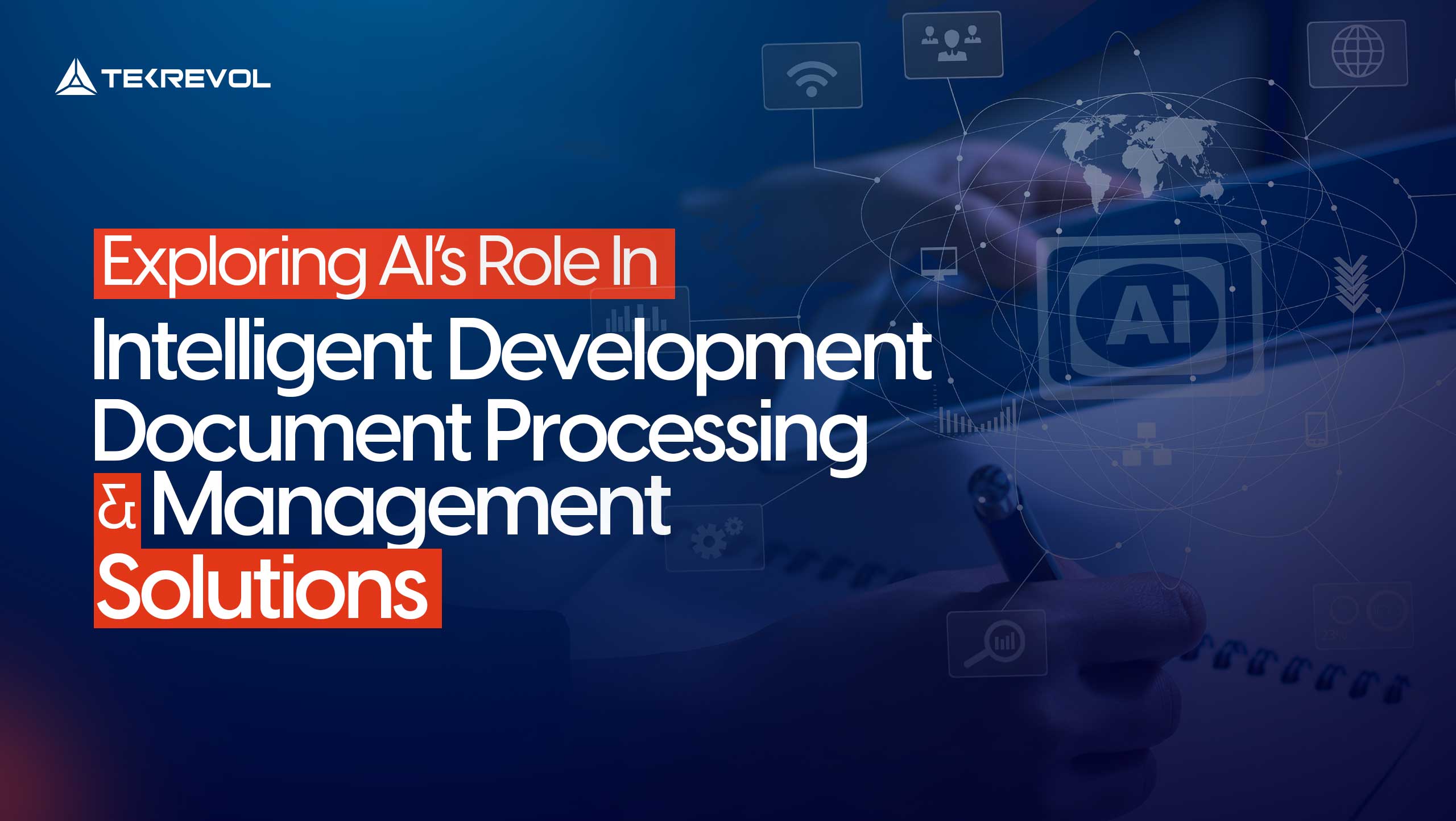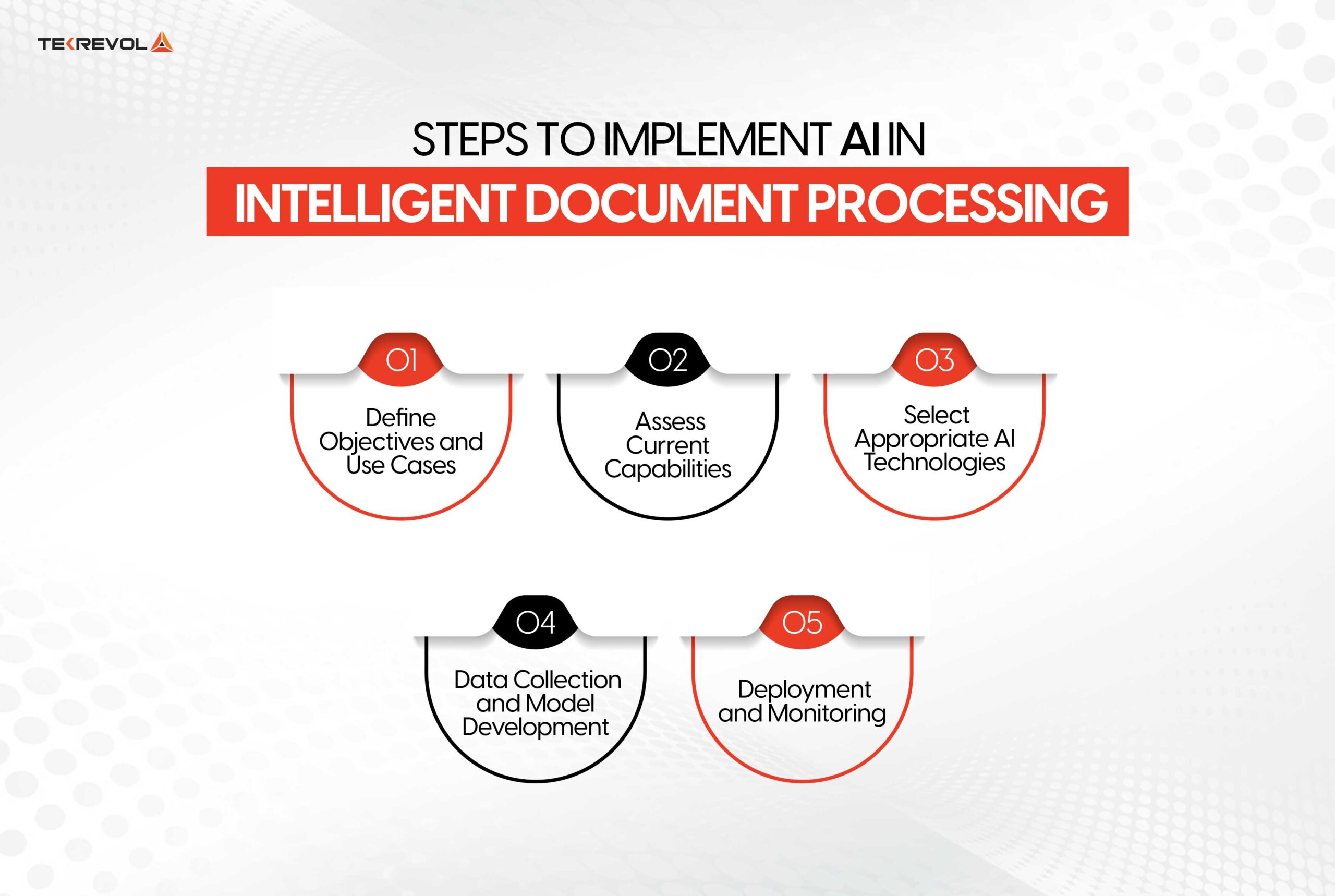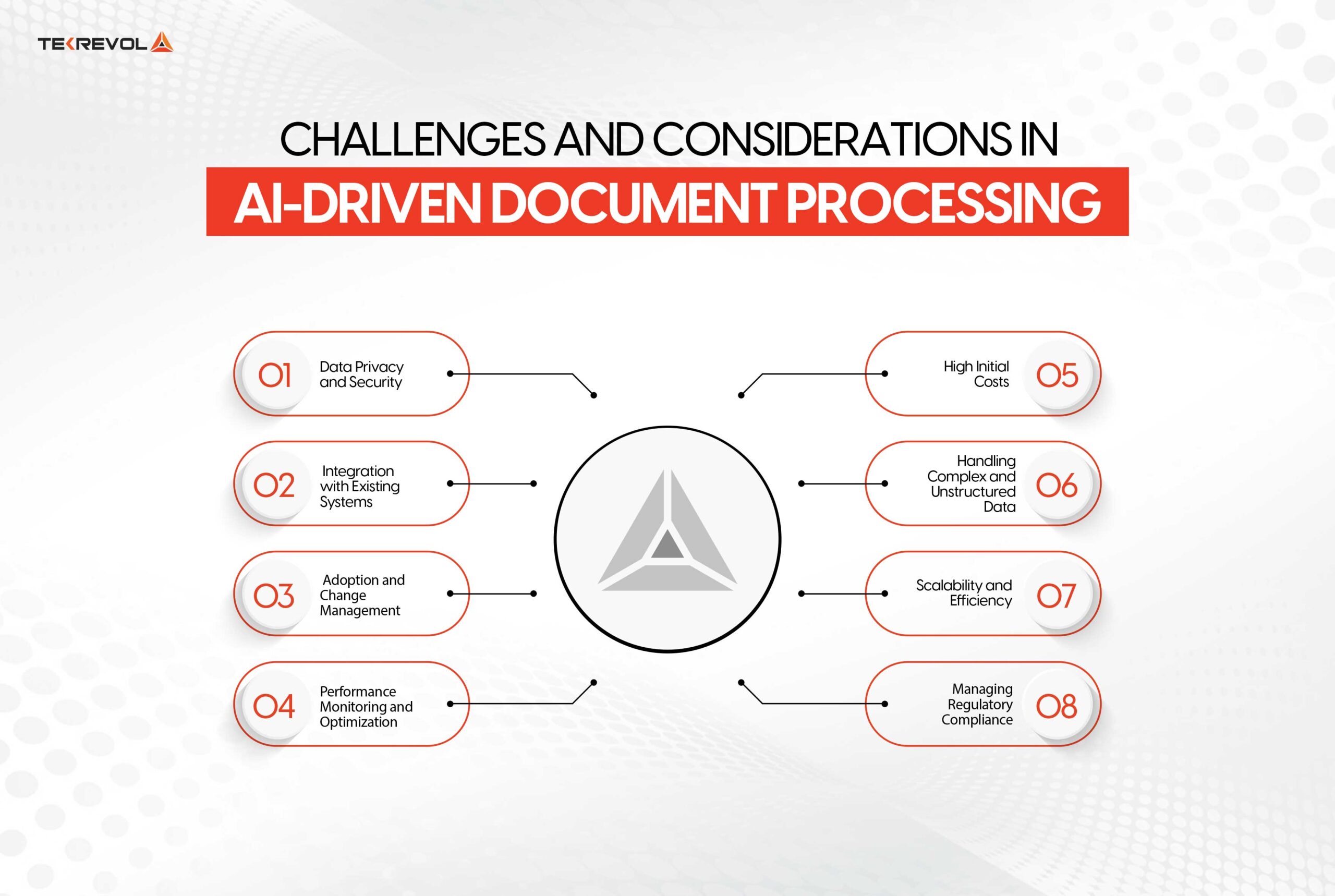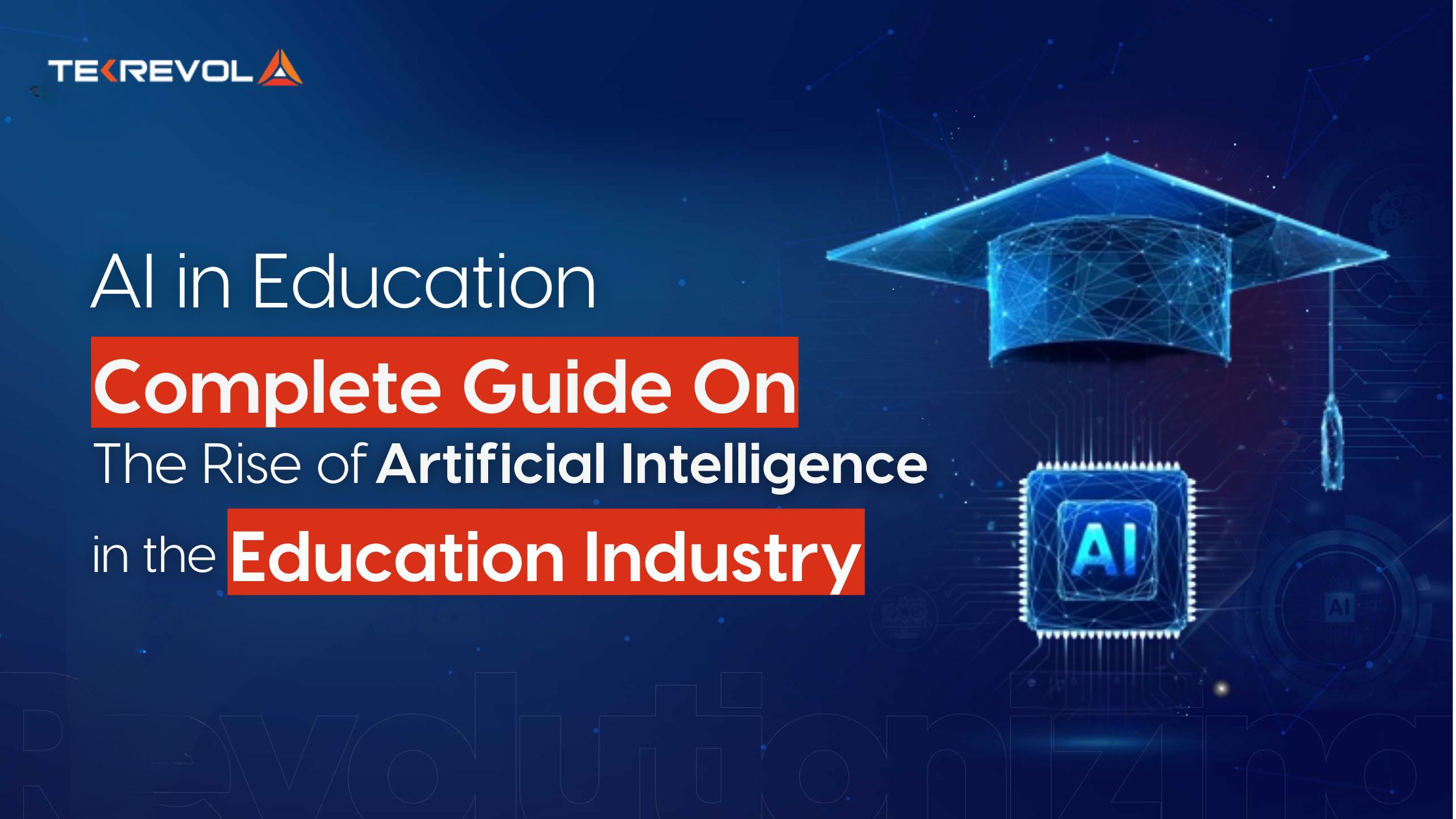Imagine waking up every morning, feeling the energy to conquer the world, arriving at your workplace with a positive attitude and a bright smile only to end up at your desk, greeted by a mountain of paperwork staring back at you.
The rest of the day will vanish manually processing each document, feeding data into your systems, and ensuring not a single spark of creativity and motivation survives before your work shift ends.
As a business owner, you can agree that this is not the best use of your highly trained and innovative minds. But not anymore. Thanks to AI, document processing and management can now be automated entirely.
AI-driven document management solutions use advanced algorithms to understand, classify, and process documents with remarkable precision, reducing manual intervention by up to 80% while maintaining 99% accuracy.
If you, too, are a CTO, CEO, or leader tired of your teams wasting productive hours on mundane tasks such as data entry document validation and want to motivate them to do something significant, this blog is for you.
What Is Intelligent Document Processing (IDP)?
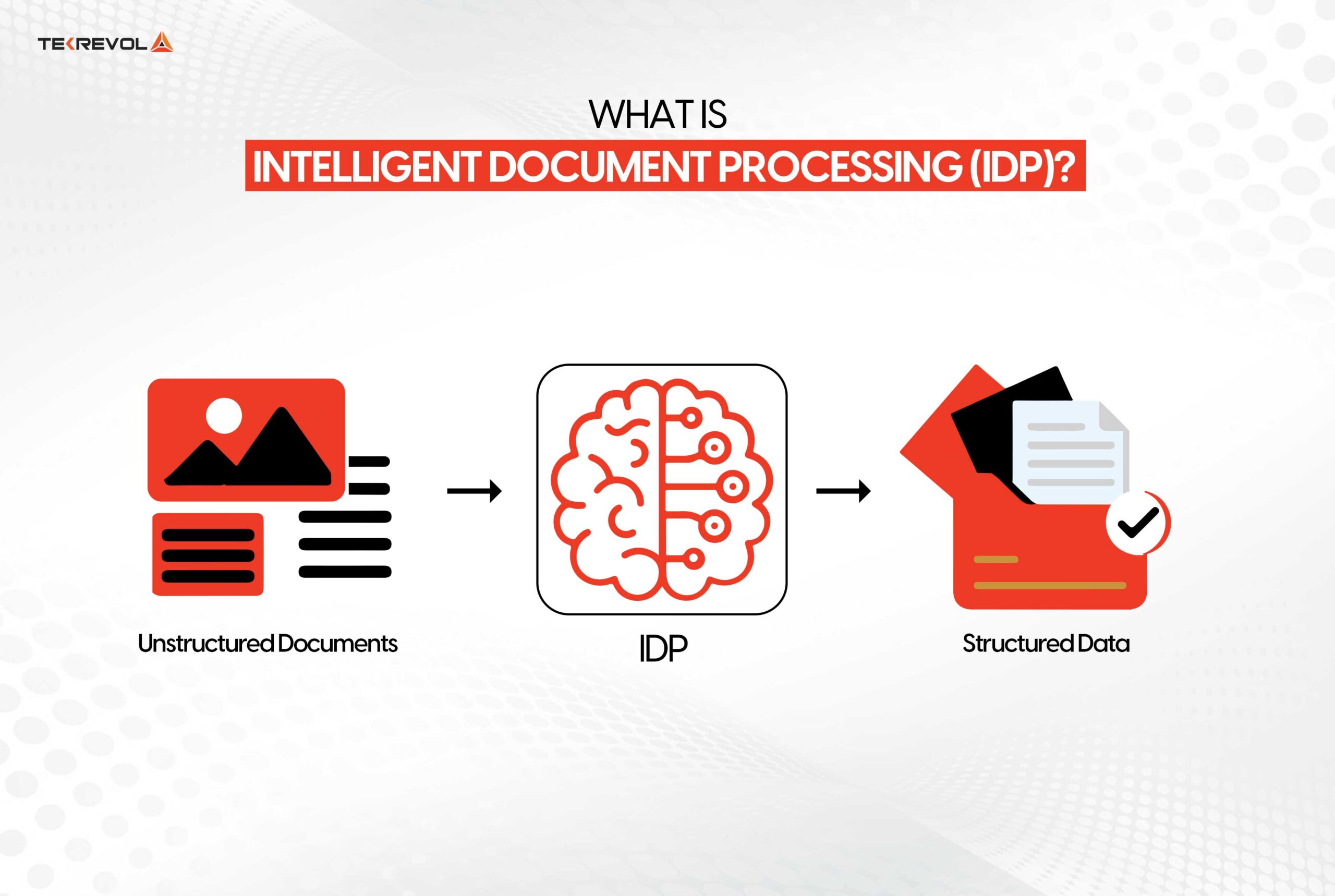
Intelligent document processing is like having a smart assistant that reads, understands, and organizes the documents automatically. These are modern technologies that combine various AI tools to process documents like a human being would, but faster and with fewer errors.
Unlike most traditionally labor-intensive methods, IDP uses advanced technologies such as optical character recognition (OCR), natural language processing (NLP), and machine learning (ML) for efficient document processing.
Let’s break this down with a simple example:
Imagine you work at a freight management firm. You must have hundreds of invoices to process. Traditionally, someone would need to:
- Open each document
- Read through it
- Type important information into a system
- Check for errors
- File it properly
That’s a lot of work, right? This is where AI-powered solutions for intelligent document processing come in.
Modern IDP systems can:
- Scan documents instantly
- Pull out important information automatically
- Sort documents into the right categories
- Spot and fix errors
- Store everything in the right place
Traditional document processing methods are manual, time-consuming, and, therefore, full of inefficiencies. Modern AI-driven approaches can automate processes by up to 70%. This way, staff can be utilized on higher-value tasks.
The best part? It does not require a tech expert. The best thing is that modern IDP systems are made to be user-friendly, so even small businesses can handle documents more comfortably.
- Ready to scale your business with AI-driven document management?
- Find out how our AI for development document automation supports your growth and scalability.
How AI Enhances Document Processing And Management Solutions
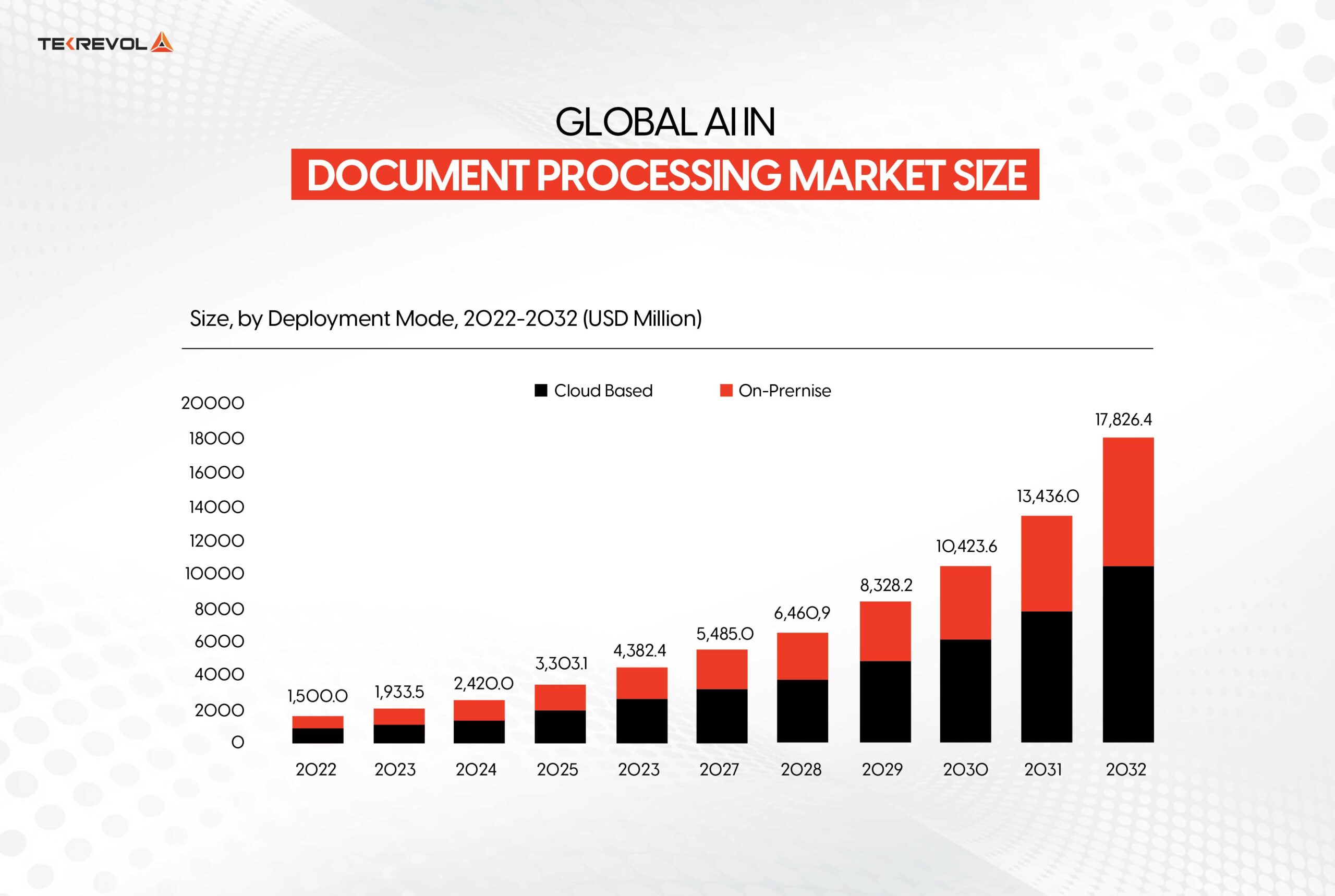
Today’s AI in document processing is more than just scanning papers. It can understand context, learn from corrections, and even handle messy handwriting. This technology is revolutionizing the way businesses process documents, and the numbers speak for themselves.
Here’s what statistics have to say about AI in document processing:
- Organizations using IDP cut their processing time by 50%, and with 80-90% of business data being unstructured, IDP is essential for modern companies.
- Implementation of IDP technologies can save up to 70% in terms of labor costs due to reduced labor spending on manual entry and validation.
- The OCR technology is a key component of the IDP market. The global market for OCR technology can touch USD 26 billion by the year 2027. Over time, this technology is being increasingly adopted and used more and more.
But what makes this technology so powerful? It’s the combination of several technologies, including:
- Optical Character Recognition (OCR) to read text.
- Natural Language Processing (NLP) to understand content.
- Machine Learning (ML) to improve over time.
- Generative AI to make smart decisions about documents.
For instance, take a global banking giant such as JP Morgan Chase. The company has adopted AI-driven tools for document processing and employs its COIN system, Contract Intelligence, to process contracts and analyze documents automatically. In doing so, the company has saved thousands of work hours and reduced human errors.
Similarly, in the UK, the National Health Service has integrated IDP solutions to facilitate the more efficient management of patient records. It enabled improved accuracy while decreasing the chances of medical errors, hence increasing better healthcare results.
Want to Achieve a Successful Launch? Read Our Comprehensive Guide On: Soft Launch vs. Hard Launch: What’s the Difference?
Key Processes In AI-Driven Document Management
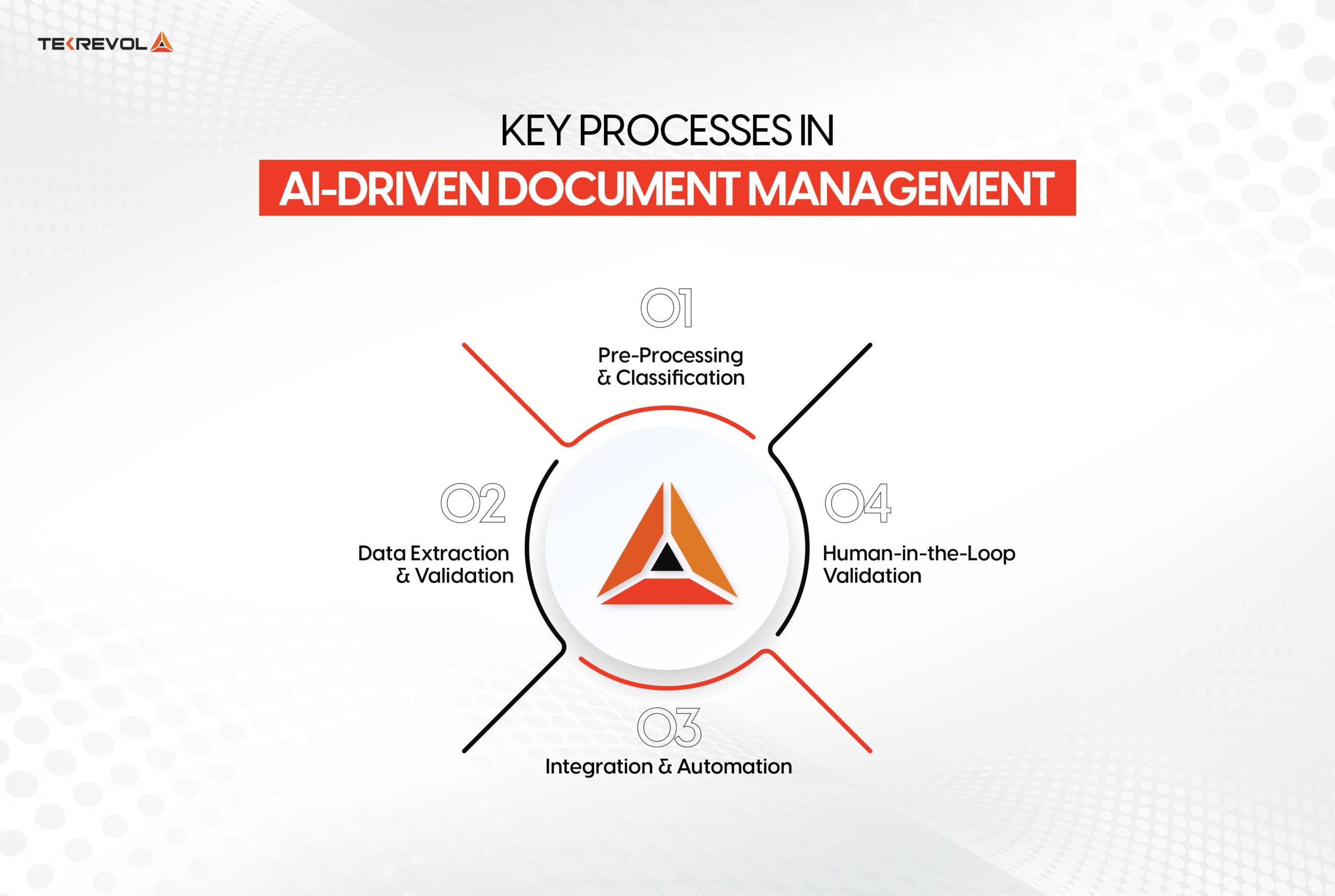
The key processes in AI-driven document management streamline how businesses handle vast amounts of data, combining automation with human expertise for unmatched efficiency. Let’s break these processes into simple steps.
Pre-Processing and Classification
Before any document can be processed, it needs to be cleaned and organized. AI in document processing ensures raw data is ready for automation by:
- Removing noise or irrelevant information from scanned files.
- Converting images or handwritten text into a readable digital format using Optical Character Recognition (OCR).
Once pre-processed, intelligent document processing solutions categorize documents based on their content. For instance:
- AI can automatically sort invoices, contracts, and receipts into predefined folders.
- Advanced AI applications in document management learn patterns to enhance classification accuracy over time.
By automating this stage, businesses can eliminate hours of manual sorting and reduce errors.
Data Extraction and Validation
Data extraction is the heart of AI-powered solutions for intelligent document processing. Using technologies like Natural Language Processing, AI extracts information ranging from the regular structured formats of tables to unstructured ones such as handwritten notes.
- Structured Data: Automating extraction from forms, invoices, or databases ensures consistent results.
- Unstructured Data: AI’s deep learning models process emails, PDFs, or images with high accuracy, converting them into actionable data.
Validation plays a key role here. Machine learning ensures that extracted data matches expected standards, reducing the risk of errors.
For example, AI can flag a typo in an email address during extraction, ensuring seamless downstream processes.
Human-in-the-Loop Validation
At this point, you should be certain that AI won’t replace human intuition. Even with AI’s precision, certain tasks require human judgment. Enter the human-in-the-loop model, where AI handles repetitive tasks while humans validate critical decisions.
- AI processes documents and flags uncertain or high-stakes entries (e.g., a discrepancy in legal contracts).
- Humans review these flagged items, ensuring the highest accuracy.
This combination enhances trust in smart document processing with AI, especially for industries like healthcare and finance, where data precision is paramount.
Integration and Automation
Finally, intelligent document management systems with AI applications seamlessly integrate into existing enterprise workflows. Using APIs, AI connects with other tools like CRMs or ERPs, creating a unified system.
For instance:
- A customer’s scanned contract can trigger an automated email notification in the CRM system.
- Data extracted from an invoice could directly update accounting software.
The benefits of AI in document management at this stage include time savings, better workflow automation, and reduced reliance on manual input.
These steps for AI for development document automation not only optimize daily operations but also empower teams to focus on high-value tasks, driving overall productivity.
- Looking to streamline your document workflow?
- Discover how our AI-driven document management solutions enhance efficiency and accuracy.
Benefits Of AI In Document Management
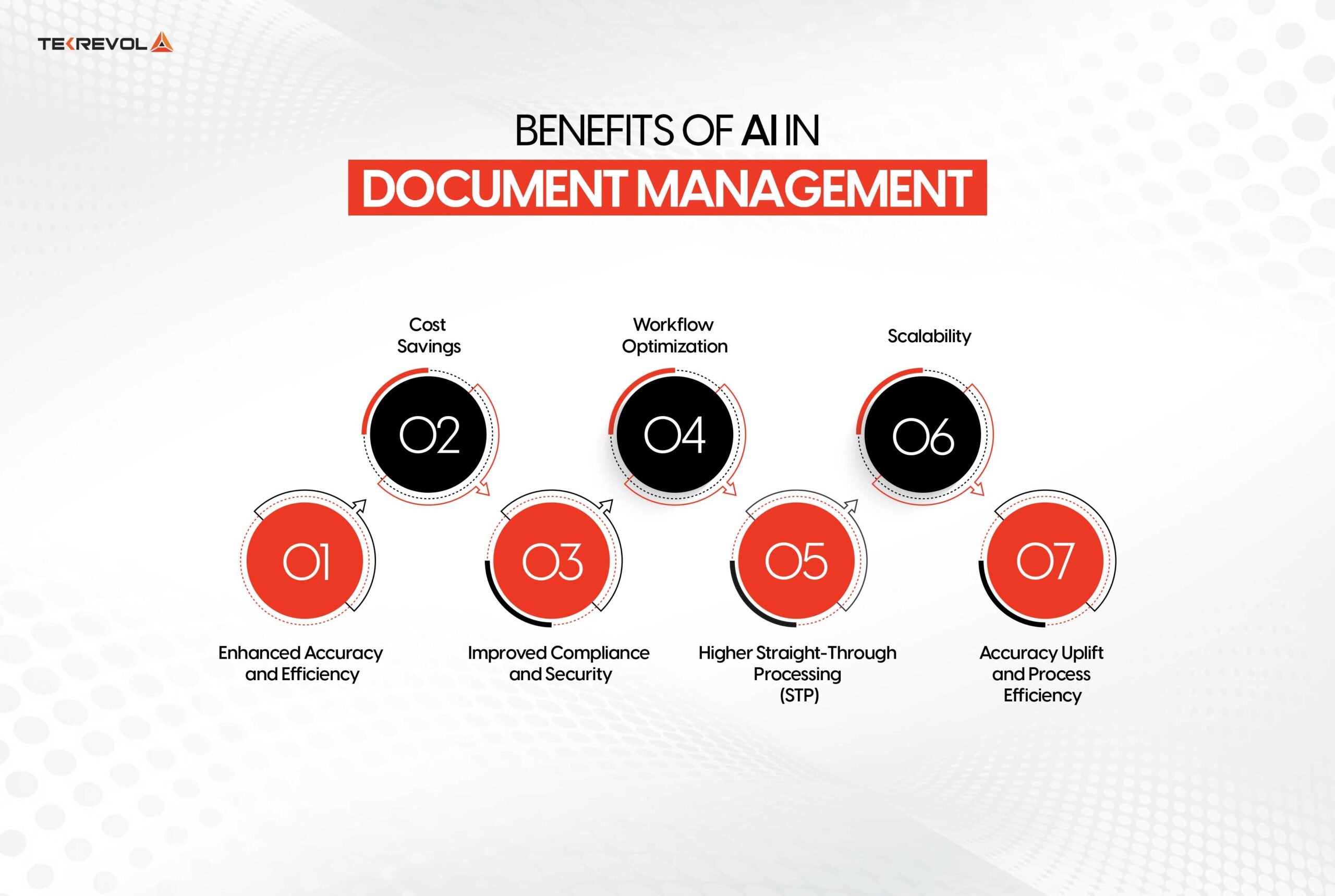
You might be asking yourself, is investing in intelligent document processing solutions actually worth it? Can AI minimize manual effort while maintaining data accuracy and security?
These are valid questions. To help you make an informed decision, let’s explore the benefits of AI in document management and how it transforms business operations.
Enhanced Accuracy and Efficiency
Document processing errors can come at a steep price. By leveraging AI-driven intelligent document processing, error rates are dramatically reduced. With AI solutions, inbuilt OCR and NLP tools ensure that data extraction and processing are done accurately to a level as high as 99%.
Cost Savings
Automating document-centric activities will remove dependence on manual labor, thereby reducing operational costs. Companies using AI for smart document processing report saving up to 70% in costs due to streamlined workflow and overheads.
Improved Compliance and Security
AI applications in document management help businesses comply with rules through automated checks and potential risk flagging. The anomaly detection feature will automatically ensure the security of sensitive information so that data breaches or compliance failures are less likely to happen.
Real-Time Insights
With AI for development document automation, businesses can quickly analyze large volumes of documents, creating actionable insights in real time. For instance, through an AI-driven system, trends are identified in customer feedback emanating from scanned survey forms, enabling data-driven decisions.
Workflow Optimization
With end-to-end automation through intelligent document management systems and AI applications, workflows become smoother. By eradicating repetitive tasks, AI allows for faster approvals of documents and data integration among departments, increasing the overall efficiency of the process.
Higher Straight-Through Processing (STP)
AI enhances STP rates, allowing documents to move through the system without manual intervention. This eliminates bottlenecks in processes like invoice approvals or compliance reviews, ensuring faster turnaround times.
Scalability
As businesses grow, so does the volume of documents they handle. AI-powered solutions for intelligent document processing offer scalable systems capable of processing high data volumes efficiently, adapting to increasing demands with ease.
Accuracy Uplift and Process Efficiency
AI systems not only ensure data accuracy but also enable end-to-end automation. This results in a noticeable uplift in process efficiency, cutting down on processing times while ensuring the output remains error-free and consistent.
Wonder What Software Will Dictate Our Future? Read More on: 18 Types of Software Development that Will Dominate 2025 and Beyond
Advanced AI Technologies In Document Processing
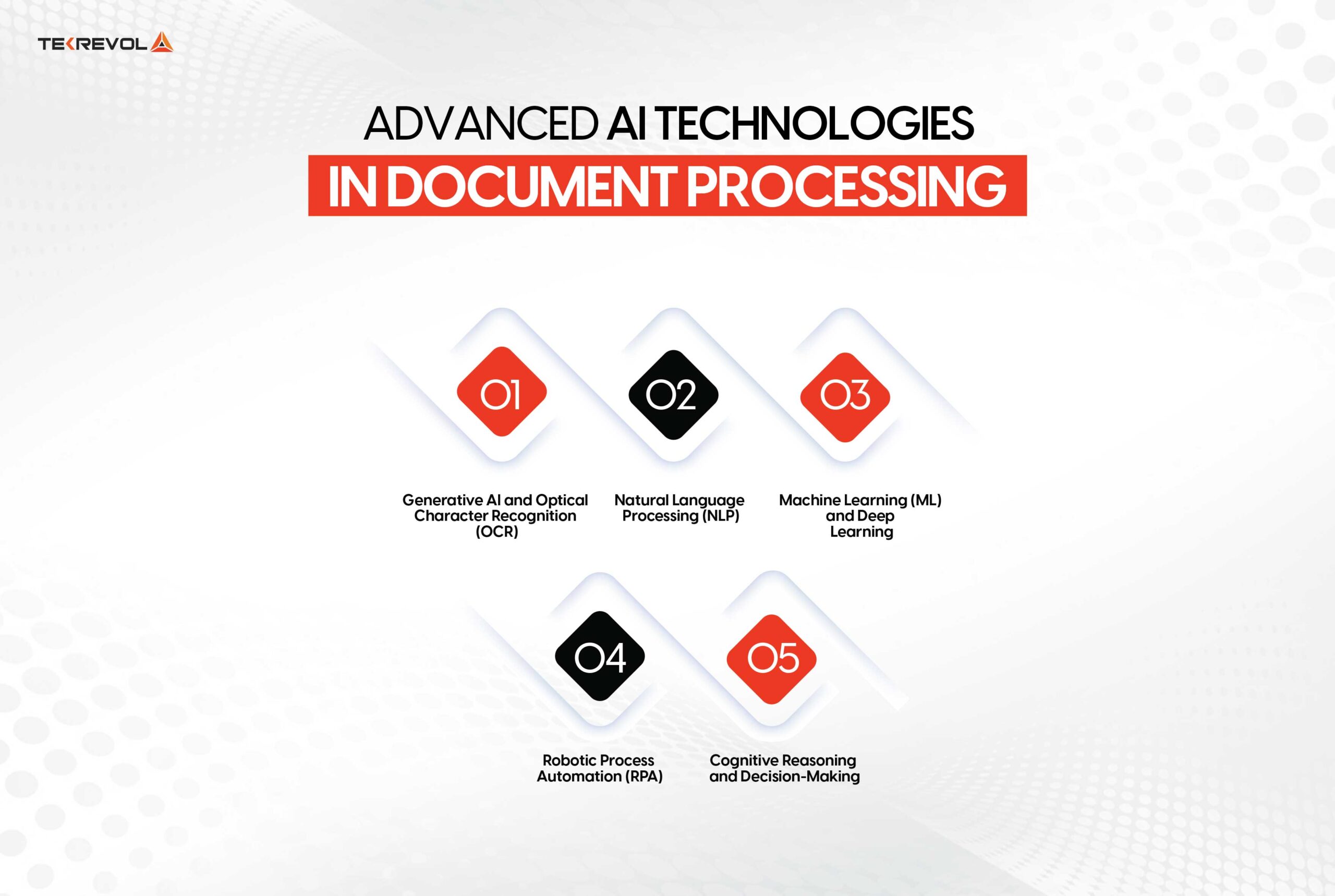
By this point, we’ve explored the fundamentals of AI in document processing, from how it works to its key processes and benefits.
But what makes it all possible? The answer lies in advanced technologies that revolutionize how businesses handle their documents. Let’s explore these transformative tools.
Generative AI and Optical Character Recognition (OCR)
Thanks to Generative AI solutions, OCR has come a long way from basic text recognition. With AI integration, it now identifies and extracts text from images, handwritten notes, and even distorted documents with remarkable accuracy.
For example, AI-powered OCR in the legal industry can digitize complex contracts, extract key clauses, and flag discrepancies for review, saving countless hours of manual effort.
Generative AI extends the capabilities of OCR by filling what are likely gaps for most systems, like interpreting low-resolution scans and finding ways to fill in missing data entries.
Natural Language Processing (NLP)
NLP allows systems to decipher and interpret the meaning of text content in documents. This is especially useful in industries such as healthcare and finance.
For example, NLP can help extract information pertaining to a patient’s records from medical records or analyze forms from customers that contain feedback to review the sentiment.
Incorporating NLP, intelligent document processing solutions can look beyond simple data extraction to provide deeper contextual comprehension of document content.
Machine Learning (ML) and Deep Learning
Machine Learning allows systems to improve with every interaction, whereas deep learning manages more complex data patterns. These are the cornerstones of AI-based solutions applied to intelligent document processing, where systems can adapt to novel document formats and learn from previous processing errors.
Robotic Process Automation (RPA)
RPA combines AI with processes to automate mundane tasks, including document approvals, compliance checks, or report generation. This streamlines workflows and frees up human resources to focus on high-value tasks.
A good example is its use in accounts payable, where RPA automates the matching of invoices to both payments and accounts payable generalized ledger. This way, significant amounts of processing time are saved.
Cognitive Reasoning and Decision-Making
Cognitive reasoning takes document processing further by analyzing data to make intelligent decisions. For instance, insurance companies apply cognitive AI to process claims, check policy compliance, and even predict the probability of a fraud incidence based on historical data.
This ability is extremely useful in industries that need precision and dependability, like banks, where a wrong choice can result in catastrophic losses.
- Looking to boost operational efficiency?
- See how AI in document processing can transform your business processes.
Applications Of AI In Document Processing Across Industries
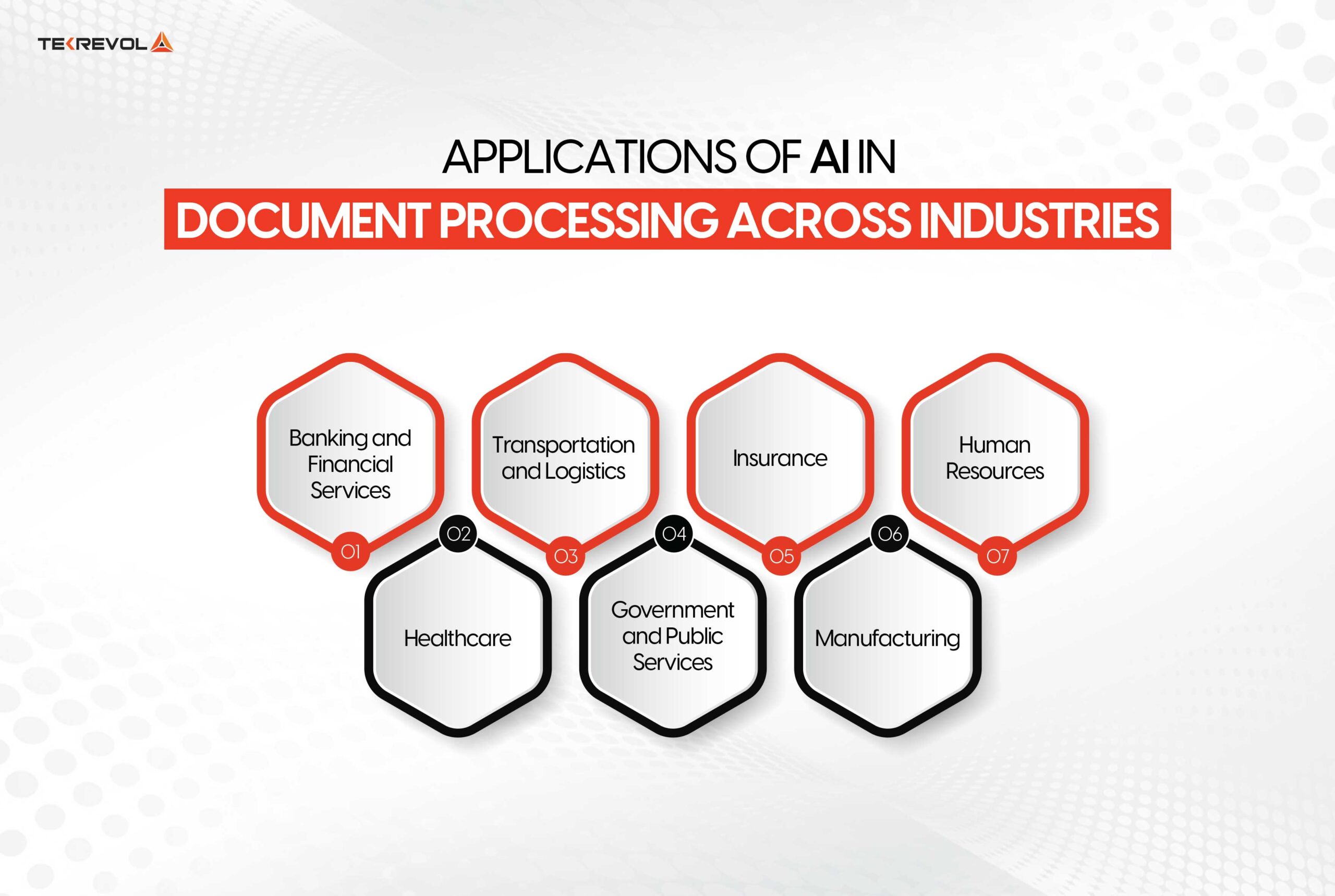
The adoption of AI in document processing spans across industries, revolutionizing how businesses handle data-intensive tasks. With intelligent document processing solutions, companies achieve greater efficiency, accuracy, and scalability.
Here’s how AI applications in document management are transforming various sectors:
Banking and Financial Services
The banking industry is highly data-driven, with high areas of compliance and accuracy. AI applications primarily help automate processes like Know Your Customer (KYC), loan documentation, and invoice processing.
- HSBC applied AI-based document management to make KYC operations faster, reducing processing times by 40%.
AI analyzes financial statements, detects anomalies, and prevents regulatory breaches, saving valuable time and resources.
Healthcare
Unstructured data from patient records, insurance claims, and medical forms causes a lot of challenges to healthcare systems. Smart document processing with AI will streamline them for improved accessibility and accuracy.
- Mayo Clinic uses AI to extract critical patient data from handwritten medical records, reducing administrative workloads.
AI also accelerates insurance claim approvals, ensuring quicker patient reimbursements.
Transportation and Logistics
In logistics, managing invoices, shipment details, and regulatory documentation can be overwhelming. AI-powered solutions for intelligent document processing optimize these workflows.
- FedEx employs AI to manage shipment documentation, automate invoice approvals, and improve logistics tracking.
Government and Public Services
Government agencies often deal with enormous volumes of documentation related to citizen services, policies, and compliance. Intelligent document management systems with AI applications improve efficiency and transparency.
- The U.S. Social Security Administration adopted AI to digitize and process claims, reducing backlogs and improving service delivery.
Insurance
Insurance companies benefit significantly from AI for development document automation. By automating claim processing and fraud detection, they ensure faster and more accurate operations.
- Allstate uses AI to process claims, verify documents, and detect inconsistencies, significantly speeding up customer payouts.
Manufacturing
The manufacturing industry leverages AI applications in document management for tasks such as supplier documentation, quality control, and invoice processing.
- Siemens implemented intelligent systems to automate supply chain paperwork, ensuring seamless operations and error-free records.
Human Resources
HR departments manage a variety of documents, including resumes, onboarding forms, and compliance records. AI-powered solutions for intelligent document processing accelerate these workflows.
- Unilever uses AI to parse resumes, match them with job roles, and handle employee onboarding documents efficiently.
- Ready to automate your document management?
- Our AI-powered solutions for intelligent document processing are tailored to your needs.
Challenges And Considerations In AI-Driven Document Processing
Ensuring scalability and efficiency.
As organizations expand, they often encounter an overwhelming influx of documents. This can lead to bottlenecks in processing, making it difficult to maintain efficiency. AI applications in document management must be capable of scaling to handle increased workloads without sacrificing performance.
Solution: To tackle this challenge, businesses should adopt smart document processing with AI that can easily scale according to demand, ensuring consistent efficiency and speed.
Addressing data security and privacy concerns.
With the AI transformation of document management, safeguarding sensitive information is critical. Organizations must navigate complex regulations regarding data privacy while implementing AI solutions. Any lapses in security can lead to significant legal and financial repercussions.
Solution: Implementing robust security protocols alongside AI-powered solutions for intelligent document processing can help mitigate risks and ensure compliance with data protection laws.
Overcoming high implementation costs for AI-powered solutions.
The initial investment required for integrating intelligent document processing solutions can be a barrier for many organizations. High costs may deter businesses from leveraging the benefits of AI, leading to missed opportunities for efficiency gains.
Solution: To overcome this hurdle, companies should explore cost-effective AI development services that offer flexible pricing models, allowing them to adopt AI solutions without straining their budgets.
Managing variability of document types.
Organizations frequently deal with a wide array of document formats and structures, which complicates the processing task. This variability can result in errors during data extraction and classification, affecting overall accuracy.
Solution: Utilizing advanced intelligent document management systems with AI applications can enhance the system’s ability to recognize and process diverse document types accurately.
How TekRevol Can Help With Intelligent Document Processing Solutions
If you’re seeking to enhance your document management with AI, your search ends here. At TekRevol, we specialize in AI-driven document management solutions tailored to meet your unique business needs.
With a proven track record of delivering over 100 successful AI projects and Generative AI solutions across various industries, our team of experts is dedicated to providing intelligent document processing solutions that streamline your operations and boost efficiency.
Whether you’re dealing with manual data entry challenges or aiming to automate complex document workflows, our AI in document processing services are designed to address your specific requirements.
Contact us today to discover how our AI Development Services can transform your document management processes.
- Ready to future-proof your business?
- Partner with an AI development company and learn how our innovative AI development services can help your businesses achieve sustainable growth and innovation.

 555 Views
555 Views November 22, 2024
November 22, 2024